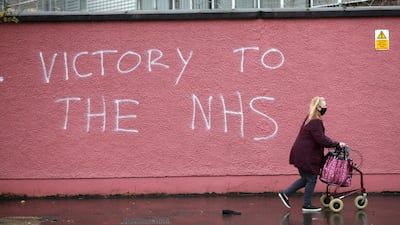The English village of Eyam has a message for 2020 about how to handle a pandemic and what to be prepared for as it moves through different phases.
Nothing is fixed when life is hostage to infection. Not for individuals, nor for the population as a whole, and not even with vaccines. The breakthroughs that have come in the run-up the vaccine rollout have been greeted as an unalloyed good. However, in many countries, the rollout could yet go to some very bad places in the months ahead.
That where the history of Eyam comes in. The village, located in England's northern Peak District, faced a plague along with other parts of the country in the 1660s. Between a third and half of Eyam's population died.
Eyam is a remote outpost. Once the plague reached it from the south, its outbreak progressed in isolation from other parts of England. Letters from a local resident that still survive recorded the terrible effects of the toll.
The residents decided to isolate themselves as the infections rose. A legend grew up that while the people of Eyam were not saving themselves by going into lockdown, they were sacrificing so that other communities would not get infected.
Over the following centuries Eyam was hailed by British writers for having saved large parts of the north of England from the ravages that afflicted the south. This was a time when doctors did not have a cure. While Europe faced a 30 year cycle of plague, there was little knowledge about how people were catching the diseases. And if people were badly affected, there was certainly no promise of treatment and recovery.
Then came the advancement of the medical profession and findings that the plagues were not "bad air" but carried by rats and fleas. Eyam became the butt of jokes for needlessly locking themselves up to stop an epidemic that they could not prevent.
Freed from the heroic legend, Eyam then became a place of ideological struggle. Different versions of the town appear in newspapers and periodicals. Did the lock-in provide a template for the cordon sanitaire or was it a futile sacrifice?
Fast forward to 2020 and Eyam has a new resonance. Billions of people have experienced isolation and stay-at-home orders. The village that did it first gives us a 400 year-plus logic for and history of staying put to limit the spread of death and disaster.
Different ways of viewing events are not limited to far-off historical lessons. When Britain administered the first vaccine outside of a clinical trial last week, there was a wave of optimism that the beginning of the end of the pandemic was here.
Two people who had the jab had severe allergic reactions, revealing an untested vulnerability of the treatment. Fake news claiming that the two patients who went first, Irish woman Margaret Keenan and Warwickshire native William Shakespeare, were actors performing a role swept the internet.
It is foretaste of the battle of perceptions to come, and how it could spiral into division, competition and conflict. Atul Gawande, a member of US President-elect Joe Biden’s Covid-19 task force, has highlighted how at present more Americans are worried about the pandemic’s threat to their health or livelihoods than at any time since June.
The failure to provide a nationwide plan for rolling out the vaccine worries him. The antagonism over mask wearing among Americans “is as nothing” to the split among Americans over who gets vaccinated.
One person in the family may get vaccine but others will not. What about children? There are no paediatric studies thus far that justify distribution among children.
With the US federal government failing to provide guidelines, the vacuum will at best be filled by the states. A dynamic of the wealthy buying vaccines is likely to be set in train. That will further heighten divisions due to claims about the "great unleveller" pandemic has already inflicted.
Figures until October 2020 show that unemployment fell about two percentage points for the top two thirds of US wage earners from peak, but by more than seven per cent for the bottom third.








The point at which vaccination stops transmission, called "herd immunity", is thought to be about 70 per cent of the population. Then there is the challenge of international distribution, which is the only long-term way to eradicate Covid-19.
That is even if people want the vaccine. Two fifths of respondents in some surveys are vaccine hesitant or worse.
Almost ten per cent of the population of Britain was found this week to following anti-vaccination sites. The Centre for Countering Digital Hate said 5.35 million people had access to conspiratorial and other wrong information.
Despite a flood of advertisements from big social media companies promoting agreements and pledges with European governments on countering Covid-19 misinformation, this is simply not happening. The social platforms are not excluding and removing the material that causes people to have false beliefs.
Only one of 27 already-identified, major anti-vaccination sites in the UK have been removed in recent months.
Views on the vaccine are not set in stone. Delivery from the pandemic is in no way a sure bet.
Damien McElroy is London bureau chief at The National














